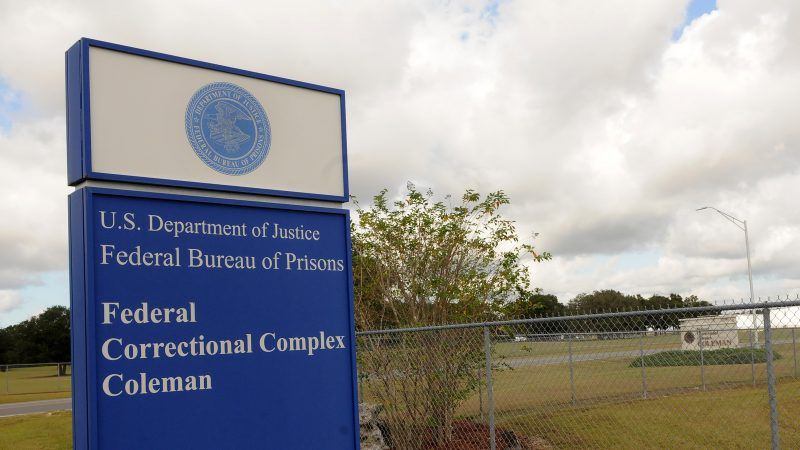Bureau of Prisons Reverses Coronavirus Home Confinement Policy
"What they are doing to people is cruel and unusual. It isn't right."

The Bureau of Prisons (BOP) abruptly changed its policy yesterday for which inmates are eligible for early release into home confinement because of the threat of COVID-19, advocates and family members of inmates say, crushing the hopes of some inmates who had already been moved into pre-release quarantine.
According to multiple accounts from family members and the criminal justice advocacy group FAMM, the BOP informed inmates on Monday that it would not be waiving a requirement that inmates serve 50 percent of their sentence before they can become eligible for home confinement, despite earlier indications that it would.
It's unclear how many inmates who were approved for early release were disqualified.
The BOP did not immediately respond to a request for comment.
"The BOP is playing with people's lives," Kevin Ring, president of FAMM, said in a statement. "It's nothing short of cruel to tell hundreds of people they are going home, notifying their families and quarantining them for days, only to change your mind afterward."
Attorney General William Barr issued a directive on March 26 expanding compassionate release and home confinement transfers of elderly and at-risk inmates to mitigate potentially deadly COVID-19 outbreaks. Politico reported on April 9 that the BOP quietly expanded the directive and waived the 50 percent requirement as the virus spread through several federal prisons.
Inmates who are approved for early release are put into quarantine for two weeks. However, Ring tweeted yesterday that family members of inmates traveled to FCC Coleman, a federal prison complex in Florida, expecting to pick up their incarcerated loved ones, only to be told the policy had been changed.
At a town hall meeting today, they were told BOP is insisting on 50% requirement and people who don't qualify had their dates revoked. Families had to return without their loved ones. Hard to imagine how you could jerk someone around worse than that. But it keeps happening.
— Kevin Ring (@KevinARing) April 21, 2020
Reason received a message yesterday from a family member of a man incarcerated at FCI Elkton, a federal prison in Ohio that has been hit particularly hard by the virus.
"Last week, my Dad was told that he would be going to home confinement based on AG Barr's memo," the family member wrote. "They made him sign numerous documents on multiple occasions. Today, they told him that he was denied for home confinement because he hasn't served 50% of his sentence yet. The 50% threshold is explicitly NOT a criteria, yet they have still done this to him. Not to mention the sentence in the first place is way above the guidelines. What they are doing to people is cruel and unusual. It isn't right."
Politico received a similar email:
"They just posted a new BOP Bulletin a few minutes ago, reversing the Barr decision and requiring that those released to home confinement must have served 50% of their sentence," Stephen Donaldson, son of an inmate at a prison in Georgia, wrote in an email to POLITICO. "I was hoping to have my father home. He tells me a number of other inmates had started the quarantine pre release and then were told of the reversal."
The notifications appear to have gone out throughout the federal prison system:
Yes I got a call from my wife today in tears because they put her back into the general population and last week they moved her into a quarantine room to prepare for home confinement. I'm a medical provider. COVID-19 doesn't care if you have served 25% or 50% of your sentence.
— Josh Sorenson (@hogwired1) April 21, 2020
Yesterday Judge Alison Nathan of the U.S. District Court for the Southern District of New York called the BOP's quarantine policies "illogical" and "Kafkaesque" and said they put inmates at greater risk of contracting COVID-19.
According to the BOP's most recent numbers, there are 497 federal inmates and 319 staff infected with the virus. So far, 22 inmates have died from COVID-19 complications. There are roughly 20,000 federal inmates over the age of 55.
FAMM sent a letter today to BOP Director Michael Caraval today requesting more information and transparency from the agency.
"Tens of thousands of families across the country are deeply and understandably frightened for the health and safety of their incarcerated loved ones," Ring wrote. "The people inside BOP's facilities are confused, frightened, and vulnerable. They deserve maximum transparency from the BOP."


Show Comments (23)